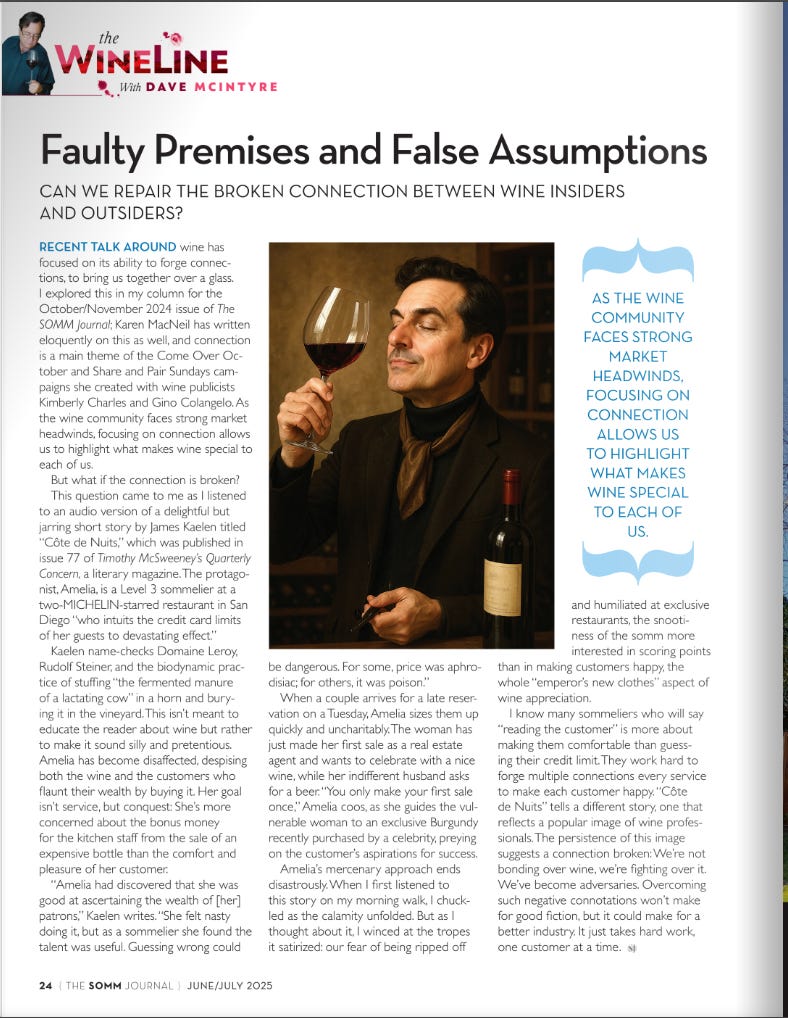Broken Connections
How can the wine community overcome stereotypes and re-establish connection?
Recent talk around wine has focused on its ability to forge connections, to bring us together over a glass. I explored this in my column for the October/November 2024 issue of The SOMM Journal. Karen MacNeil has written eloquently on this as well, and connection is a main theme of her Come Over October and Share and Pair Sundays campaigns with wine publicists Kimberly Charles and Gino Colangelo. As the wine community faces strong market headwinds, focusing on connection helps us focus on what makes wine special to each of us.
But what if the connection is broken?
This question came to me as I listened to an audio version of a delightful but jarring short story titled “Côte de Nuits,” by James Kaelen, published in issue 77 of McSweeney’s Quarterly Concern, a literary magazine. The protagonist, Amelia, is a Level 3 sommelier at a two-Michelin star restaurant in San Diego “who intuits the credit card limits of her guests to devastating effect.”
Kaelen name-checks Domaine Leroy, Rudolf Steiner and the biodynamic practice of stuffing “the fermented manure of a lactating cow” in a horn and burying it in the vineyard. This isn’t meant to educate the reader about wine, however, but to make wine sound silly and pretentious. Amelia has become disaffected, despising both the wine and the customers who flaunt their wealth by buying it. Her goal isn’t service, but conquest; she’s more concerned about the bonus money for the kitchen staff from the sale of an expensive bottle than the comfort and pleasure of her customer.
“Amelia had discovered that she was good at ascertaining the wealth of [her] patrons,” Kaelen writes. “She felt nasty doing it, but as a sommelier she found the talent was useful. Guessing wrong could be dangerous. For some, price was aphrodisiac; for others, it was poison.”
When a couple arrive for a late reservation on a Tuesday, Amelia sizes them up quickly, and uncharitably. The woman has just made her first sale as a real estate agent and wants to celebrate with a nice wine, while her disinterested and disaffected husband asks for a beer. “You only make your first sale once,” Amelia coos, as she guides the vulnerable woman to an exclusive Burgundy recently purchased by a celebrity, preying on the customer’s aspirations for success.
Amelia’s mercenary approach ends disastrously. When I first listened to this story on my morning walk I chuckled as the calamity unfolded. She could be anyone who becomes disaffected and loses idealism and motivation in their career. For Amelia, being a sommelier is no longer a calling; it’s just a paycheck. I can relate — we all can relate at one time or another.
But as I thought about the story, I winced at the tropes it satirized: Our fear of being ripped off and humiliated at exclusive restaurants, the snooty somm more interested in scoring points than in making customers happy, the whole “emperor’s new clothes” aspect of wine appreciation.
I know many sommeliers who will say “reading the customer” is more about making them happy than guessing their credit limit. They work hard to forge multiple connections every service to make each customer happy.
“Côte de Nuits” tells a different story, one that reflects a popular image of wine. The persistence of this image suggests a connection broken. We’re not bonding over wine, we’re fighting over it. We’ve become adversaries.
A slightly different version of this article appeared in the June-July 2025 issue of The SOMM Journal, and will be in the July-August issue of its sister publication, Tasting Panel Magazine. Unfortunately, the link to the audio version of the story seems to work only for New York Times Audio subscribers.



I don't have anything helpful to say, other than this is sad.
I'm a romantic at heart, I realize. An idealist. I want Italy to be full of La Dolce Vita. And I want to drink wine as if I'm in a Baudelaire poem.
I guess what's at the core of this (as Wendy said) is empathy. Integrity. A choice to live in such a way that sloughs off cynicism despite the training we are all getting from our algorithms.
Voices like yours help.
I have heard this scenario all too frequently Dave. But there are still a few of us out here who truly care about caring for a customer and really helping them explore the world of wine without pretention, versus pushing our own agenda on them. I wish I had the answer, but it all just depends on whose hands are on the bottle or behind the bar. How do you train for empathy?